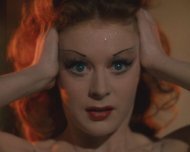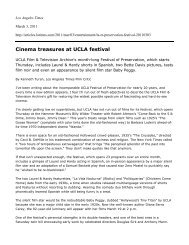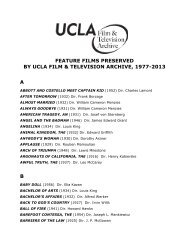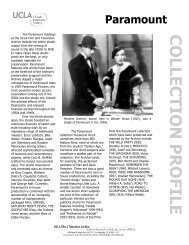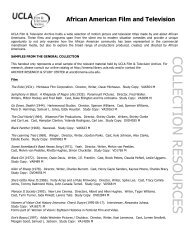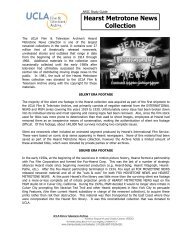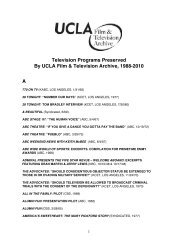"Heroic Grace" catalog - UCLA Film & Television Archive
"Heroic Grace" catalog - UCLA Film & Television Archive
"Heroic Grace" catalog - UCLA Film & Television Archive
You also want an ePaper? Increase the reach of your titles
YUMPU automatically turns print PDFs into web optimized ePapers that Google loves.
THE SIX-FINGERED LORD OF THE LUTE, PART I<br />
[LOKE CHI KAM MOH, SEUNG CHAP/LIU ZHI QIN MO, SHANGJI]<br />
Hong Kong 1965 Director: Chan Lit-ban<br />
An action-packed “sword and sorcery” three-parter, THE SIX-FINGERED LORD OF THE LUTE leaves no narrative device unturned. (The<br />
<strong>Archive</strong> is only showing Part I, leaving the spectator in the most delightful cliffhanger, as sinister shadows gather in the dark around<br />
attractive young heroes.) There is a McGuffin (a box containing a mysterious object); a martial arts couple feuding over the education<br />
of their son; and the son, ravishingly played by 1960s (female) teen idol, Connie Chan Po-chu. There is a bevy of martial arts masters,<br />
thugs and lone women—all from different martial arts schools, dressed in ways that do not always coincide with their biological gender,<br />
and wielding swords, knives, bludgeons, whips, darts, or chains. There are beggars, ghosts and the mysterious Lord of the Lute himself,<br />
whose evil music, illustrated by some of the most exuberant pre-Tsui Hark special effects in Cantonese cinema, can paralyze those<br />
unlucky enough to hear it.<br />
The protagonists are endlessly travelling, fighting their foes at crossroads, spending the night in sinister inns, arriving uninvited at<br />
the mansions of other clans, jumping in the air or through windows, are ambushed, drugged, challenged to duels, and even killed.<br />
Daughters and sons vow to avenge their parents, fathers their children, husbands their wives, and students their masters, so the plot<br />
keeps churning at a brisk pace.<br />
As such, the film is a treat for contemporary audiences, though its historical significance is no less lacking. Its production company,<br />
Sin-Hok Kong-luen, helped revive in postwar Hong Kong, the Shanghai silent cinema’s practice of adapting martial arts fiction to the<br />
screen. In this case it was a novel by Ni Kuang (Ngai Hong), who later became Zhang Che’s screenwriting partner. The film was remade in<br />
1994 as DEADFUL MELODY, starring Brigitte Lin Qingxia (Lin Ching-hsia) and Yuen Biao.<br />
—Bérénice Reynaud<br />
Studio: Sin-Hok Kong-luen. Producer: Yee Hoi-cheng. Screenplay: Leng Hon, Kong Yeung, Lau Tan-chong. Based on the novel by Ni Kuang<br />
(Ngai Hong). Cinematography: Leung Hong. Martial Arts Director: Kwan Ching-leung. Art Director: Tong Pui-sun. Editor: Tsui Kit-fong.<br />
Music: Poon Cheuk. Cast: Connie Chan Po-chu, Lee Gui-on, Sek Kin, Tam Cheng-hong, Kong Fu-seng.<br />
Beta-SP, in Cantonese (unsubtitled), 94 min.<br />
Tape Source: Hong Kong <strong>Film</strong> <strong>Archive</strong><br />
34<br />
CONNIE CHAN PO-CHU<br />
This 1960s teen star appeared in over 230 films<br />
between her screen debut in 1959 and her retirement,<br />
at the age of 25, in 1972. Versed in both<br />
Southern and Northern fighting styles, Chan<br />
became an icon of the Cantonese cinema at a time<br />
when the industry was facing stiff competition<br />
from Mandarin productions. Chan tried a wide<br />
array of genres but became best-known for her<br />
work in contemporary youth dramas, teen comedies<br />
and martial arts films.<br />
SATURDAY MARCH 1




